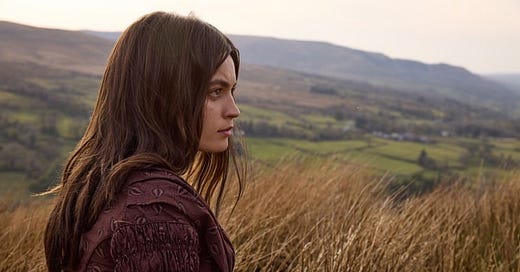(Tempo Productions / Bleecker Street Films)
The fan-fictionalization of the biographical film genre has been something to witness the past few years. Back in the day, if you rewrote too much of the famous person’s life in your biopic, you got dinged for it by both fans and reviewers; with the filmmakers then having to awkwardly claim they needed to take all that artistic license for ‘narrative reasons.’ We got this with dramas like Oliver Stone’s The Doors (1991), David Anspaugh’s Rudy (1993), Ron Howard’s Cinderella Man (2005), even all the way up to Bryan Singer’s Bohemian Rhapsody (2018). Sometime around Dexter Fletcher’s Rocketman (2019), people started not caring so much about historical accuracy and separating the real legend from the movie. “Elton John is not only a real person, but also a fictionalized film character I can now treat as my own.” Now, we’re seemingly getting heavily fictionalized biopics everywhere from Baz Luhrmann’s Elvis (2022), Andrew Dominik’s Blonde (2022), Marie Kreutzer’s Corsage (2022) to now Frances O’Connor’s Emily. With Rocketman, at least the creators officially had John’s blessing to do “whatever they wanted” to his personal life as long as the picture was entertaining. But all the subjects of the other biopics released recently aren’t here to share how they feel about their lives being portrayed on film. Which makes me wonder yet again, why not just create your own characters and plot and loosely base them on real artists?
In Emily, we are in the countryside of mid-19th century England with the legendary Brontë family. The head of the clan, Rev. Patrick Brontë (Adrian Dunbar) is the sole patriarch for his children: traditionalist Charlotte (Alexandria Dowling), feminist Anne (Amelia Gething), lively, outgoing Branwell (Fionn Whitehead) and sad, lonely girl Emily (Emma Mackey). Any family would be lucky to produce one talented author, but in the Brontës, there are three in the daughters, as well as a painter in Branwell. While the siblings enjoy passing the time creatively with fiction, art and music; they also have come to the ages where they have to choose between practical living and making a profession out of their writing and painting. Oliver Jackson-Cohen co-stars as Patrick’s handsome curate, William Weightman, new in town and instantly catching the eyes of Emily and Charlotte. Naturally, Mr. Weightman is drawn to Emily, the alluring outcast, the most.
(Tempo Productions / Bleecker Street Films)
By O’Connor’s script for Emily, we are supposed to believe our protagonist is all the usual female lead tropes: beautiful, misunderstood, gifted, troubled, and ahead of everyone else. Older sister Charlotte doesn’t understand her and is jealous of her talent, Branwell is the sibling she gets along with the most, and Anne is just along for the ride. There is melodrama everywhere, and while the Brontë family was legitimately tragic in reality; there was supposedly no rivalry between the sisters and brother, and all were generally supportive of each other. There isn’t any reference to Anne’s own efforts as an artist in the new feature and Emily is given the love interest who was actually, more likely Anne’s secret lover in real life. The biggest character assassination is Charlotte. O’Connor goes as far as to portray Emily as the sister who was first published, with Wuthering Heights (1847), and this inspires her sisters to write their own novels. When historically, Charlotte’s Jane Eyre was already out two months earlier and she influenced her younger siblings to follow suit.
I’m not even a literature expert or a huge fan of the Brontës, but even to me, this all comes off really distracting. Mackey gives a great performance and is much better utilized here than in Ken Branagh’s shlocky Death on the Nile (2022). But did O’Connor really need to not only make it obvious she likes Emily more than Charlotte, but also portray Emily and Branwell as the most attractive family members? Based on the few drawings and paintings out there, all the relatives were pretty equal in looks. The romance in Emily is fine, and it’s nice to have legitimate love scenes on the big screen, but the relationship progression isn’t really anything we haven’t seen in previous costume dramas. The visual aesthetics are decent, though I could have used less of the shaky cam whenever characters needed to run. And yet again, night scenes are way too dark for whatever reason. O’Connor, whom you might remember as an actress in Y2K era movies like Harold Ramis’ Bedazzled (2000), Steven Spielberg’s A.I.: Artificial Intelligence (2001) and Oliver Parker’s The Importance of Being Earnest (2002), unfortunately leaves a bit to be desired behind the camera.
I went into Emily hoping to enjoy it, since a well-made biopic can occasionally make up for the inaccuracies, and others are appreciating this one. But sadly, it didn’t work for me. Sometimes I think it might be better if modern biopic writer-directors would just post their historical fanfic to Archive of Our Own and call it a day.






I’m really on the fence about seeing this. I love the Brontes and have recently been reading a lot about them. It sounds like this movie is full of inaccuracies which will bother me. With Emily, it comes down to people romanticizing her because she wrote Wuthering Heights which is considered a great love story. It is kind of but there are very few good characters, good in heart and intentions, in that book. I love it, don’t get me wrong!
Anyway, I could go on but this family holds such a special place in my heart that I might pass on the film. Thank you for reviewing it!